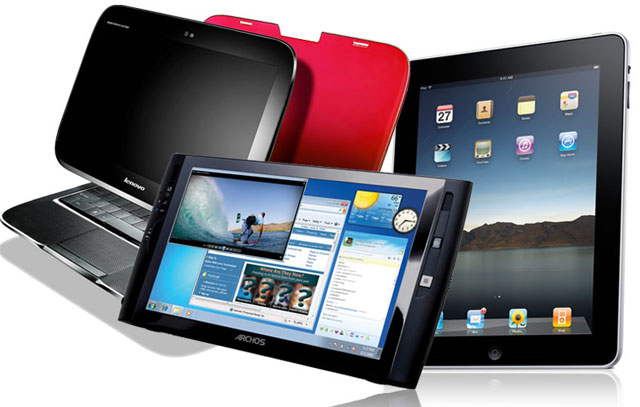Office people choose tablet or ultrabook?
Many people believe that ultrabook is a laptop, while tablets are like a large smartphone. But after all, both are "computers" and you are in the middle of buying one, not both.

While laptops and netbooks all take up to a few minutes to boot or restore from sleep mode due to the sluggishness of mechanical hard drives, ultrabooks and tablets take only a few seconds thanks to outstanding speed. of SSD.
Both ultrabooks and tablets hold advantages that make them the first choice for consumers. Here are the comparisons of these two products, hopefully readers will have a more intuitive look at their choices.
External design
Tablets are praised and loved because they are thin and ultra-portable, some models are only slightly larger than a smartphone. The iPad 2 is about 0.7 cm thick, the Eee Pad Transformer is only 1.3 cm thin and the Galaxy Tab 10.1 is 0.8 cm thin.
Meanwhile, ultrabooks are 2cm thick, but you'll get a much larger screen than a tablet: 13.3 inches compared to nearly 10 inches of a tablet (another way is a tablet). However, 2cm is no bigger than 1 cm anyway, but the difference in how ultrabooks and tablets work will make users decide which products to choose.
Although ultrabook is heavier than an average tablet of about 600g, in general this is not a big distance. Both are super-thin and ultra-light products, so they will be the ideal companion for those who travel and go on business.
Hardware
Ultrabooks are equipped with the second generation Intel Sandy Bridge processor, powerful enough to perform most tasks such as watching HD movies, video editing, and processing graphic images. They are full-featured computers compressed into a frame that is only 2 cm thin.
Meanwhile, tablets mainly run on ARM chips designed to run smoothly with Android or iOS operating systems. There are also several tablets running Windows 7 with AMD's Atom or Fusion processors, but their performance isn't as expected.
Furthermore, tablet processors can handle applications, including HD content, but their capabilities are far from the Sandy Bridge processor's capabilities.
In terms of work efficiency, for a tablet computer, office staff will hardly be able to type text ' shorthand ' like on a laptop or desktop computer. Usually they can only type ' pecking ' because the touch keys are quite small and seamless of a tablet.
That is why many tablet makers are willing to sell discrete keyboard accessories for their products. However, users will have to spend a significant amount of money on this device.
However, it seems that the tablet is not working for the purpose of entertainment with the ' great ' features like surfing the web, watching HD videos, playing high quality games on one interface Users shiny and beautiful.
Moreover, due to the slim and light design, there is still no important tablet connected USB 2.0 (the new tablet only has micro USB port). Others lack HDMI ports, so many users will find it difficult to bring tablets into presentations.
With utrabook it is completely different. This is really a copy of the laptop. Not as small and light as a tablet, but ultrabook is more suitable for work thanks to a larger screen, physical keyboard built in and supports almost all connections like a true laptop.
Software
Most tablets, except for the iPad series, run on Android, one of the flexible and customizable operating systems. It is also a platform that is actively provided by the active community of new applications and also means that users will have thousands of applications to choose from.
The current ultrabooks still run on Windows 7 and come here as Windows 8 - still the best operating system for an ultra-thin laptop, with the familiar office software suite and countless applications for office work.
However, software copyright issues can cause users to spend more money, or have to go to open source applications.
Product price
The biggest reason that prevents customers from ultrabook is that they are too expensive. In fact, the Vietnamese market will be hard to find any ultrabook products that cost less than 20 million USD. Therefore, ultrabooks are usually just products for business people.
Meanwhile, tablets are quite diverse in types, designs and prices: you can buy a tablet for between 5 million and 18 million depending on your needs and availability. my financial ability.
Used Time
This is also the point that the tablet is better than ultrabook. IPad models for up to 10 hours, while other tablets like Galaxy Tab, Acer Iconia, Asus EeePad . also allow users to run the machine for 8 consecutive hours.
Also with ultrabook, battery life is only about 5 hours. Manufacturers are still trying to apply new technologies to improve battery life for the ultra-thin line of computers.
Epilogue
Tablets and ultrabooks all have their own advantages and disadvantages. Therefore, consumers need to base their demand on practical use to decide which products to buy.